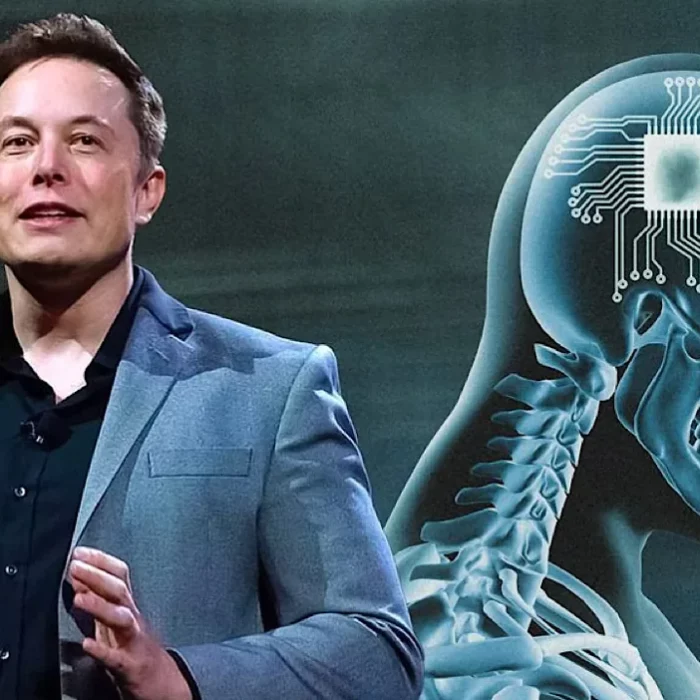
rajkotupdates.news : elon musk in 2022 neuralink start to implantation of brain chips in humans
In the world of technology, Elon Musk is a name that needs no introduction. Known for his ambitious and groundbreaking projects like SpaceX and Tesla, he has now set his sights on a new venture: Neuralink. This brain-machine interface company was founded by Musk in 2016, to develop high-bandwidth brain implants that can help humans communicate with computers and other devices.
And now, it seems Neuralink is ready to take its next big step. In 2022, the company plans to start implanting brain chips in humans – a move that could open up a whole new world of possibilities for human-computer interaction. But what does this mean for us? How will these implants work?
Introducing Elon Musk and Neuralink
Elon Musk is a South African-born entrepreneur, engineer, and inventor who has made a name for himself in the tech industry as the founder of companies like SpaceX, Tesla, and The Boring Company. Now, he’s turning his attention to the human brain through his latest venture: Neuralink. This startup aims to develop high-bandwidth brain-machine interfaces that will enable humans to interact with computers in new ways.
Neuralink was founded in 2016 to create an implantable device that would allow people to control computers or other devices with their minds. In 2022, Musk announced that Neuralink had successfully implanted its first brain chip into a human volunteer during clinical trials. The device, known as the N1 Link, is implanted directly into the brain and allows users to control digital devices using their thoughts.
Musk believes that Neuralink could eventually be used to treat neurological disorders such as Parkinson’s disease or epilepsy by directly stimulating parts of the brain. He also envisions a future where humans merge with artificial intelligence through neural implants, enabling us to enhance our cognitive abilities beyond what we’re currently capable of. While there are still many ethical concerns surrounding this technology, it’s clear that Elon Musk and Neuralink are making significant strides toward revolutionizing how we interface with technology at a fundamental level.
Also Read: EARBUDS FOR GAMING LOW LATENCY GAMING WIRELESS BLUETOOTH EARBUDS
Brain Chips:
The concept of brain chips has been around for quite some time now, but it was only in 2022 when Elon Musk’s Neuralink started the process of implanting them into humans. Brain chips are essentially tiny devices that can be implanted into a person’s brain to help improve their cognitive abilities. These chips have the potential to revolutionize the way we interact with technology and each other.
One of the most significant advantages of having a brain chip is that it can help people who suffer from neurological disorders like Parkinson’s or epilepsy. The chip can monitor the person’s brain activity and provide real-time feedback to help manage their symptoms effectively. Additionally, these chips can also be used to enhance memory and learning capabilities, making it easier for people to acquire new skills and knowledge quickly.
However, there are also ethical concerns associated with brain chips. Some argue that they could lead to a dystopian future where people become overly reliant on technology, while others worry about privacy issues since these devices could potentially be hacked or misused by governments or corporations. Despite these concerns, it cannot be denied that brain chips have tremendous potential in improving human lives if implemented responsibly and ethically.
What are they and how do they work?
Neuralink is a neurotechnology company founded by Elon Musk in 2016. The company is focused on developing implantable brain-machine interfaces (BMIs) that can help people with neurological disorders and injuries to communicate more effectively with the world around them. The idea behind BMIs is to create a direct interface between the human brain and computer systems, allowing for the seamless exchange of information.
A typical BMI consists of a series of electrodes that are implanted directly into the brain tissue. These electrodes pick up signals from individual neurons, which can then be translated into meaningful data using advanced algorithms and machine learning techniques. This data can then be used to control external devices, such as prosthetic limbs or computers, allowing users to interact with their environment in new and exciting ways.
The potential applications for BMIs are vast, ranging from helping people with paralysis to regain mobility to enabling individuals with communication difficulties to express themselves more fully. However, there are also ethical concerns surrounding the development of this technology, particularly regarding issues such as privacy and autonomy. As such, it will be important for developers like Neuralink to carefully consider these issues as they continue pushing forward with their research and development efforts.
Implantation Process:
The implantation process of brain chips is a complex procedure that involves multiple steps to ensure its success. The first step is the insertion of a tiny electrode array into the brain, which allows communication between neurons and the implanted device. This is done using specialized surgical tools and techniques to minimize damage to adjacent tissues.
Once the electrode array has been inserted, it needs to be connected to an external device that will provide power and interpretations for the signals received from the brain. This requires an additional surgical procedure where a small connector is placed beneath the skin behind the ear, allowing for seamless communication between both devices.
After implantation, patients must undergo rigorous testing and monitoring to ensure their safety. This includes regular check-ups with medical professionals who can monitor any changes in behavior or health that may indicate complications related to this procedure. While there are risks associated with brain chip implantation, many proponents argue that its benefits outweigh these concerns as it could ultimately lead to breakthroughs in treating neurological disorders or augmenting human intelligence.
How will the procedure be carried out?
The procedure for implanting brain chips in humans is still largely unknown, as the technology is still in its early stages. However, it is believed that the process will involve a surgical procedure to implant a small device into the patient’s skull. This device will then be connected to electrodes that are inserted into specific areas of the brain, allowing for communication between the brain and external devices.
The surgery will likely be carried out under general anesthesia, with a team of trained surgeons and medical professionals overseeing the procedure. The implantation process may take several hours to complete, depending on the complexity of the device being implanted and any potential complications that arise during surgery.
Once implanted, patients will need to undergo regular check-ups and monitoring to ensure that their brain chips are functioning correctly. It is also possible that patients may need to undergo additional procedures or adjustments if there are any issues with their implants over time. While this technology has enormous potential for improving human health and well-being, it will require careful consideration and oversight from medical professionals as it continues to develop.
Benefits of Brain Chips:
The benefits of brain chips are numerous and have the potential to revolutionize the way we live. One of the most significant advantages is that they can help individuals with neurological disorders such as Parkinson’s disease, epilepsy, or spinal cord injuries. Brain chips can aid in restoring lost functions by providing an interface between the brain and external devices.
Another benefit of brain chips is that they could enhance cognitive abilities, such as memory retention and recall. By implanting a chip that can communicate with the brain, individuals may be able to learn new information more efficiently and retain it for longer periods than before.
Brain chips could also improve communication and connectivity among individuals. With implanted chips, people could send messages directly from their brains without having to rely on verbal or written language. This innovation has immense potential for those who cannot speak due to physical disabilities or impairment.
Overall, while there are still many ethical questions surrounding this technology’s implementation, the benefits of brain chips cannot be ignored. If done correctly and safely, these implants hold enormous promise for improving human health and quality of life.
What advantages will this technology bring?
The technology of brain chips has the potential to bring numerous advantages to humanity. Firstly, this technology could revolutionize healthcare by helping people with disabilities or neurological conditions. Brain chips can help individuals with paralysis regain control over their limbs or even help those who have lost their sight see again.
Furthermore, brain chips could enhance our cognitive abilities and improve our memory retention. This technology may be used to improve learning capacity and overall productivity, allowing us to complete tasks more efficiently and accurately. Additionally, brain chips can lead to a safer world as they may prevent accidents caused by human error in high-risk environments such as aviation or nuclear power plants.
In conclusion, the implantation of brain chips in humans is an exciting advancement that provides immense potential for various benefits ranging from improved healthcare treatment options to enhancing cognitive abilities. With continued developments in this field, we may witness a new era of human interaction with technology that will transform our lives forever.
Also Read: EXPLORING THE BENEFITS OF BEING A FREELANCE WRITER
Ethical Implications:
The ethical implications of Elon Musk’s Neuralink project are vast and complex. On one hand, the technology has the potential to revolutionize healthcare by providing assistive devices for those with disabilities or cognitive impairments. However, it also raises concerns about privacy invasion and control over human beings.
One major concern is the potential for misuse of brain implants by corporations or governments to manipulate people’s thoughts or behaviors. There is also a risk that these devices could exacerbate existing inequalities between those who can afford them and those who cannot. Furthermore, implanting a chip into someone’s brain may have unforeseen consequences on their mental health and well-being.
Overall, as with any emerging technology with immense potential power over human life, there must be careful consideration of its ethical implications before widespread adoption occurs. We must ensure these technologies serve humanity in ways that are beneficial rather than harmful.
Understanding the concerns surrounding brain chips.
While the concept of brain chips may seem like a futuristic solution to various problems, it raises concerns about privacy and control. The idea that our thoughts and actions could be monitored or manipulated through these chips is a significant worry for many people. Additionally, implanting foreign objects into the brain poses potential health risks, such as infection or damage to surrounding tissue.
Another concern is the potential for inequality and discrimination. If brain chips become widely available, those who can afford them will have access to enhanced cognitive abilities and potentially gain an advantage over those who cannot. This could create a divide between those who are “enhanced” and those who are not.
Overall, there are valid concerns surrounding brain chips that need to be addressed before widespread implementation in humans. As with any new technology, careful consideration must be given to ethical implications and potential consequences on society as a whole.
The Future of Humanity:
The future of humanity is rapidly changing, with the advent of advanced technologies such as neural implants. Elon Musk’s Neuralink startup has begun the process of implanting brain chips in humans, which has significant implications for the future direction of human evolution. These chips have the potential to enhance cognitive abilities, allow for direct communication between individuals and machines, and even extend life expectancy.
However, this technology also raises ethical concerns about privacy invasion and control over one’s mind. The possibility of hacking or misuse by those in power cannot be ignored. As neural implants become increasingly prevalent, regulations must be put in place to protect individuals from potential harm.
Overall, while there are exciting possibilities for the future of humanity with these advancements in technology, we must approach them with caution and consider their long-term impact on society as a whole.
How will this impact our lives in the long run?
The impact of brain chips on our lives, in the long run, is a topic that raises numerous questions and concerns. The primary objective of Elon Musk’s Neuralink project is to develop a technology that enables humans to interact with machines through thought. This revolutionary technology can potentially transform our lives by allowing us to control everything from our devices to our homes.
However, there are also concerns about the ethical implications of implanting chips into human brains. Some experts have raised concerns about privacy, security, and the potential for abuse by governments or corporations. Moreover, there are still many unknowns regarding how the brain will respond to this kind of intervention.
Despite these uncertainties, it is clear that brain chips have enormous potential to revolutionize healthcare by providing new treatments for neurological disorders such as Parkinson’s disease or epilepsy. As we move towards a more interconnected world where humans and machines work together seamlessly, the use of brain chips may become increasingly common in various domains such as education, entertainment, and military applications. Overall, while there are legitimate concerns about the impact of this technology on society in general, it is clear that it has enormous potential to create significant benefits for humanity if developed safely and ethically over time.
Conclusion:
In conclusion, the idea of brain chips in humans is both fascinating and concerning. While Elon Musk’s Neuralink has promised to revolutionize the way we interact with technology, many ethical and practical concerns need to be addressed before widespread implementation can occur. One major concern is privacy – how will our thoughts and actions be monitored and controlled? Will it lead to a dystopian future where authorities can read our minds?
Furthermore, there are questions about who will have access to this technology. Will it only be available to the wealthy elite or will it be accessible to all? And what happens if something goes wrong during implantation – what are the long-term effects on our brains and bodies? Until these questions are answered, it is important for us as a society to approach this topic with caution and skepticism.
Overall, while brain chips may seem like an exciting prospect for tech enthusiasts, we must consider the potential risks and consequences before embracing them fully.











